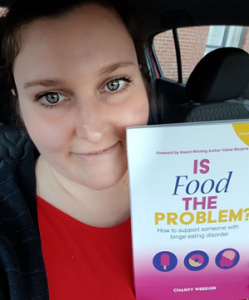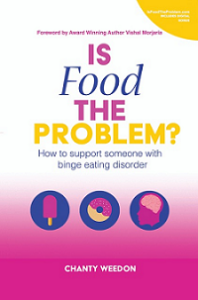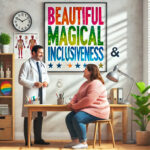Is food the problem? How to support someone with Binge Eating Disorder (BED)
Is food the problem? How to support someone with Binge Eating Disorder (BED)

by Chanty Weedon
Understanding how to support someone with Binge Eating Disorder (BED) when you have no experience can be challenging. This is the first hurdle that my family faced even before my diagnosis. They did not know what to do or say to help. I was very private about my BED and, even though I was getting support from an eating disorder team, I was not open to discuss this with anyone. I could see how heart breaking it was, particularly for my mum, to witness a binge and feel helpless as I literally self-destructed in front of her.
After being diagnosed with BED the secretive part of my bingeing disappeared. Out of nowhere I began bingeing in front of immediate family members. I could justify this behavior now. “It is okay, I have an eating disorder.” The diagnosis almost contributed to it.
Late one evening I was sitting in the lounge with Mum. Everyone else had gone to bed. I was on the sofa and she was on an armchair. We were talking, just generally, but I was eating non-stop in front of her. I could see this was distressing for her to witness. I had been piling on the pounds and she knew I would hate myself for this. Each mouthful I took she was desperate to say something. Mum started asking me if I felt I had had enough. Of course! I knew that I had, but I felt unable to stop eating. Eventually, Mum approached me and took the food, saying: “You’ve had enough now.”
The feeling that came over me was something I had never felt before. It was like someone else had taken over my body as I chased her to the kitchen. I stopped her in her tracks and held her shoulders tightly, almost shaking her, and shouted: “Give me that food or I will do something dreadful to you.” These words are far from what healthy me would say! I don’t even know where they came from. Mum handed the food back to me calmly and said that I would be seeing the doctor tomorrow because this was not normal behavior. As I sat back on the sofa to re-commence the binge I realized that this eating disorder was more than about food; it was a mental health issue. I started to wonder if food was really the problem or was there more to it?
I wanted to know more. It wasn’t enough now to have this label of BED and not understand it. I didn’t want others to experience what my family had. They felt like they were walking on eggshells at times, hoping and praying that they didn’t say anything that would trigger a binge or an argument. I could see the pain I was causing everyone, but couldn’t explain how they could support me. I decided to write about it, in the book Is Food The Problem? How to support someone with Binge Eating Disorder.
My aim in writing this book is to help other families witnessing their loved one going through BED. It gives an insight into the work that takes place with an eating disorder team to help families understand and be the support system their loved one desperately needs.
Beat, the eating disorder charity in the UK, defines BED as: “A serious mental illness where people experience a loss of control and eat large quantities of food on a regular basis.”
BED is not as well-known and is often underplayed when compared with anorexia or bulimia, but it is more common than you may realize. BED is not about choosing to eat large portions of food or to overindulge. Binge eating is not normally a form of pleasure or enjoyment, but in fact can be very distressing as you feel out of control and unable to stop despite often feeling sick due to the large amount of food consumed.
If you want to quit smoking there are many over the counter support options available. You can purchase nicotine sprays, mints, patches, vape cigarettes and of course, support from your GP. Similarly, if you choose to stop drinking you can attend Alcoholics Anonymous, here, the operative word being “choose.” However, with BED, which may seem like an addiction, you cannot take a vow of abstinence as you need food every day to sustain your body. This is what makes controlling this eating disorder even more challenging.
BED can be described in various ways, namely:
- Feeling out of control while eating
- Eating food faster than normal
- Eating until you feel overly bloated and sick
- Eating even when you are full and not hungry
- Experiencing feelings of guilt and shame due to bingeing
- Grazing all day
- Storing up food ready for a binge
- Eating on the sly or alone
If you recognize your loved one is exhibiting some of these descriptions it is time to reach out for help. My book helps to explain what BED is, the tell-tale signs, and how it feels, and considers if it’s not food, what is the problem? There is discussion on whether there is a right or wrong way to support someone. Distraction techniques and ways to problem solve to reduce the risk of a binge are also discussed.
 About Chanty
About Chanty
I developed issues with food as a child, about nine years old, however I wasn’t diagnosed formally with BED until I was 31. Having a “label” almost created a monster in me. BED affected the way I lived my everyday life as I literally planned my life around food and binges and hid away from friends and family as the weight inevitably pilled on. I became almost totally isolated and was unable to describe what was happening in my mind.
BED has shaped my life in a way I would never have expected. I’m a plus size fitness coach and teach classes once a week. I’ve met amazing women and have gone to places that I could never have imagined to talk about BED and help others. This has helped my recovery process, through being open and honest about struggles and achievements with others.
Alongside the book, I run a six-week course every two months and provide 1-1 online coaching. I also offer free digital downloads that include printable adult coloring pages (as a distraction technique), and printable food diary to monitor eating behavior and patterns. For details, email: info@isfoodtheproblem.com.
If you are experiencing symptoms of binge eating, support is available at:
If you are a caregiver and are feeling concerned, support is also available at:





